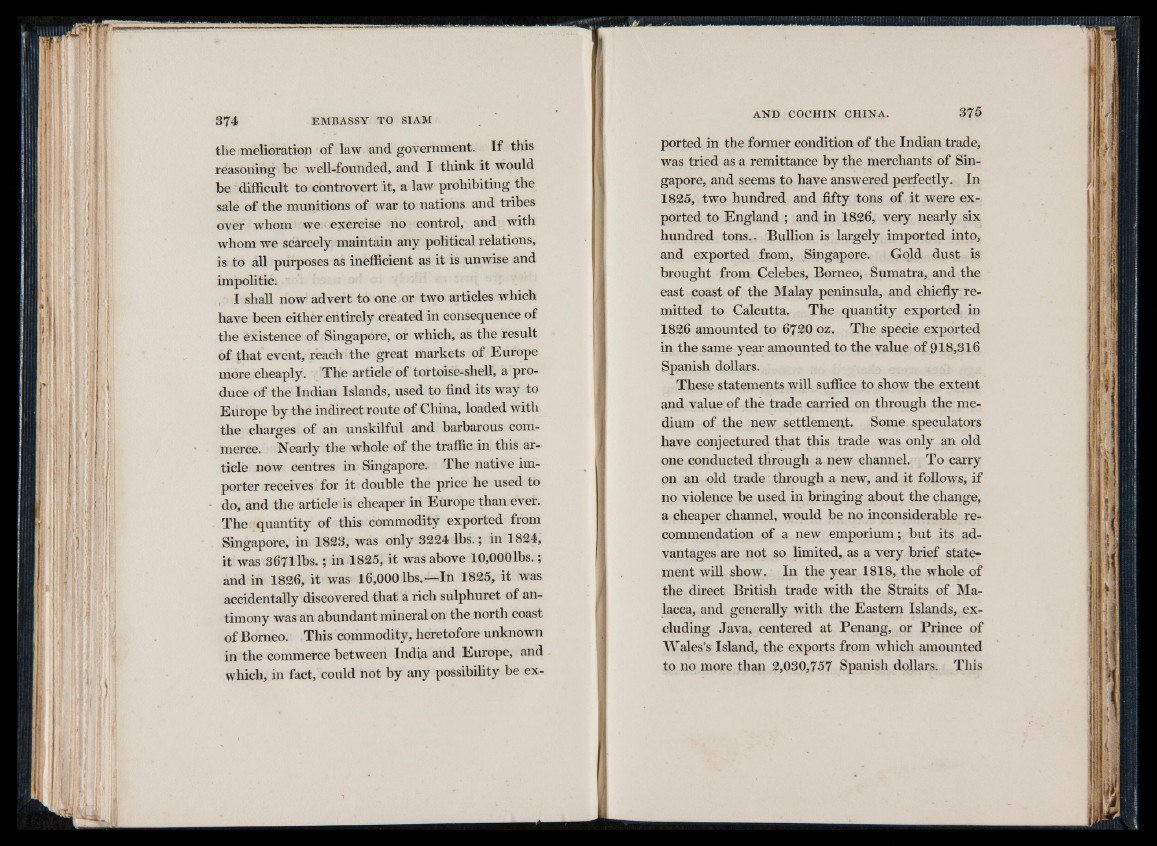
the melioration of law and government. If this
reasoning be well-founded, and I think it would
be difficult to controvert it, a law prohibiting the
sale of the munitions of war to nations and tribes
over whom we exercise no control, and with
whom we scarcely maintain any political relations,
is to all purposes as inefficient as it is unwise and
impolitic.
I shall now advert to one or two articles which
have been either entirely created in consequence of
the existence of Singapore, or which, as the result
of that event, reach the great markets of Europe
more cheaply. The article of tortoise-shell, a produce
of the Indian Islands, used to find its way to
Europe by the indirect route of China, loaded with
the charges of an unskilful and barbarous commerce.
Nearly the whole of the traffic in this article
now centres in Singapore. The native importer
receives for it double the price he used to
do, and the article is cheaper in Europe than ever.
The quantity of this commodity exported from
Singapore, in 1823, was only 3224 lbs.; in 1824,
it was 3671 lbs.; in 1825, it was above 10,000lbs.;
and in 1826, it was 16,000 lbs.—In 1825, it was
accidentally discovered that a rich sulphuret of antimony
was an abundant mineral on the north coast
of Borneo. This commodity, heretofore unknown
in the commerce between India and Europe, and
which, in fact, could not by any possibility be exported
in the former condition of the Indian trade,
was tried as a remittance by the merchants of Singapore,
and seems to have answered perfectly. In
1825, two hundred and fifty tons of it were exported
to England ; and in 1826, very nearly six
hundred tons.. Bullion is largely imported into,
and exported from, ^Singapore. Gold dust is
brought from Celebes, Borneo, Sumatra, and the
east coast of the Malay peninsula, and chiefly remitted
to Calcutta. The quantity exported in
1826 amounted to 6720 oz. The specie exported
in the same year amounted to the value of 918,316
Spanish dollars.
These statements will suffice to show the extent
and value of the trade carried on through the medium
of the new settlement. Some speculators
have conjectured that this trade was only an old
one conducted through a new channel. To carry
on an old trade through a new, and it follows, if
no violence be used in bringing about the change,
a cheaper channel, would be no inconsiderable recommendation
of a new emporium; but its advantages
are not so limited, as a very brief statement
will show. In the year 1818, the whole of
the direct British trade with the Straits of Malacca,
and generally with the Eastern Islands, excluding
Java, centered at Penang, or Prince of
Wales’s Island, the exports from which amounted
to no more than 2,030,757 Spanish dollars. This